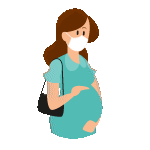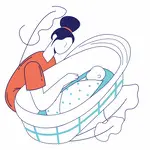Understanding the Postpartum Phase
Post pregnancy, also known as the postpartum phase, refers to the first six to eight weeks after childbirth. This period is often filled with joy as new mothers finally hold their newborn in their arms.
At the same time, it can be physically and emotionally challenging. Your body goes through several hormonal and physical changes. You are also stepping into a new role as a mother and adjusting to a new family dynamic.
Your body has worked incredibly hard. Now, it needs time to heal physically, emotionally, and mentally. This healing helps you become the best version of yourself for your baby and for yourself.
Extra care during this phase is essential. Following certain practices can help ensure smoother recovery and better well-being. Here are some ways to give your body the love and care it truly needs during this time.
Get Ample Rest
Rest is one of the most effective ways to recover after childbirth. A simple rule is to sleep when your baby sleeps.
Napping during your baby’s rest time helps restore energy. You wake up feeling refreshed and better prepared to care for your baby.
Even if sleep does not come easily, take time to rest. You can:
- Lie down with your baby
- Relax in a comfortable chair
- Close your eyes and unwind
Giving your body regular rest helps speed up recovery.
Eat Healthy Meals
During postpartum recovery, your body is healing while also nourishing your baby. This means your nutritional needs are higher.
Consulting a nutritionist or specialist can help you plan balanced meals. A healthy diet should include:
- Adequate protein
- Leafy vegetables
- Whole grains
- Healthy fats
Some foods also help increase milk production. Including these foods supports both your recovery and your baby’s nourishment.
Indulge in Self-Care
This phase is about focusing on yourself and your baby. Taking time for self-care helps you relax and recover faster.
You can include simple self-care activities such as:
- Warm baths (after your doctor’s approval)
- Listening to calming music
- Reading a relaxing book
- Practicing deep breathing or meditation
Stepping out for a short walk or fresh air can also help. A change of scenery can lift your mood and relax your mind.
Sign Up for a Postpartum Massage
Whether you had a normal delivery or a C-section, your body may feel sore after pregnancy and childbirth.
Once your doctor approves, consider a postpartum massage. It can help with:
- Back pain
- Swollen legs
- Aching feet
A soothing massage relaxes the body and calms the mind. It is often recommended for new mothers to support recovery.
Do Not Be Afraid to Seek Help
Postpartum is a time for rest and healing. You should never hesitate to ask for help.
You may need support with:
- Baby care
- Household tasks
- Preparing nourishing meals
- Daily activities that feel difficult
Ask your partner or a trusted family member for help. There is no shame in seeking support during recovery.
Talk It Out
Many women experience baby blues or postpartum depression during this phase. Hormonal changes can cause:
- Mood swings
- Crying spells
- Insomnia
- Sadness or irritability
These feelings should not be ignored. Talk openly with a trusted friend or family member. If emotions feel overwhelming, consult a doctor for guidance and support.
Make Time for Bonding
Bonding does not always happen instantly. This is completely normal. Movies and TV often show instant connection, but real life can be different.
Take time to bond naturally. You can:
- Spend quiet moments with your baby
- Talk openly with your partner
- Share family time together
Cuddles, conversations, and patience help build emotional connection over time.
Always Consult Your Doctor
New mothers often have many questions about their bodies and their baby’s health. It’s best to rely on professional advice instead of unverified sources.
Postpartum changes may include:
- Breast engorgement
- Vaginal discharge
- Excessive sweating
Some women cope easily, while others may feel discomfort or pain. Your doctor can help manage symptoms and address concerns effectively.
Do Not Worry About Body Changes
Your body has done something extraordinary. Weight gain during pregnancy is normal, and weight loss after delivery takes time.
Avoid rushing into diets or exercise plans. Wait for your doctor’s approval before making changes. Focus on recovery and your baby during this phase.
In time, you can work toward fitness goals. For now, relaxation and healing should come first.
Focus on Recovery and Positivity
Use this phase to rest, recover, and rejuvenate. Focusing on positive moments helps both your body and mind heal.
Let yourself relax. Give yourself grace. Recovery takes time, and every step forward matters.
Wishing you a healthy, calm, and nurturing postpartum journey. All the best!
FAQ's
Q. What is the postpartum phase and how long does it last?
Ans.The postpartum phase refers to the first six to eight weeks after childbirth. During this time, a mother’s body heals from pregnancy and delivery while adjusting to hormonal changes and new responsibilities. Proper care during this phase supports physical recovery, emotional balance, and overall well-being.
Q. Why is rest so important after childbirth?
Ans.Rest is essential because the body needs time to recover from the physical demands of pregnancy and delivery. Sleeping when the baby sleeps, lying down, or simply relaxing helps restore energy, supports healing, and prepares mothers to care for their newborn more effectively.
Q. What kind of diet should a new mother follow postpartum?
Ans.A postpartum diet should be balanced and nourishing, as the body is healing while producing milk. Meals should include protein, leafy vegetables, whole grains, and healthy fats. Consulting a nutritionist can help ensure adequate nutrients for recovery and to support breastfeeding.
Q. How does self-care help during the postpartum phase?
Ans.Self-care helps mothers relax both physically and mentally. Activities like warm baths, calming music, meditation, reading, or gentle walks reduce stress and improve mood. Regular self-care supports faster recovery, emotional stability, and helps mothers feel more balanced and refreshed.
Q. Is postpartum massage safe and beneficial?
Ans.Postpartum massage can be beneficial once approved by a doctor. It helps relieve body soreness, back pain, swollen legs, and aching feet. Massage also promotes relaxation, improves circulation, and supports physical recovery, making it a helpful practice for new mothers.
Q. Why should new mothers not hesitate to ask for help?
Ans.The postpartum phase is meant for healing, not handling everything alone. Asking for help with baby care, household tasks, or meals reduces stress and exhaustion. Support from partners or family allows mothers to focus on recovery without guilt or pressure.
Q. What emotional changes are common after childbirth?
Ans.Many women experience mood swings, crying spells, irritability, sadness, or insomnia due to hormonal changes. These emotional shifts are common during postpartum. However, if feelings become overwhelming or persistent, speaking to loved ones or consulting a doctor is important.
Q. Is it normal if bonding with the baby takes time?
Ans.Yes, bonding does not always happen instantly, and this is completely normal. Emotional connection develops gradually through cuddling, spending quiet moments together, and shared family time. Mothers should not feel guilty, as bonding naturally strengthens with patience and care.
Q. Why is consulting a doctor important during postpartum recovery?
Ans.Doctors help address postpartum changes such as breast engorgement, vaginal discharge, pain, or excessive sweating. While some symptoms are manageable, others may require treatment. Professional guidance ensures safe recovery, answers concerns, and helps mothers feel confident and reassured.
Q. Should new mothers worry about body changes after delivery?
Ans.Postpartum body changes are normal, including weight gain and gradual weight loss. Mothers should avoid rushing into diets or exercise until cleared by a doctor. Focusing on healing, rest, and the baby is more important, as fitness goals can be addressed later.




















